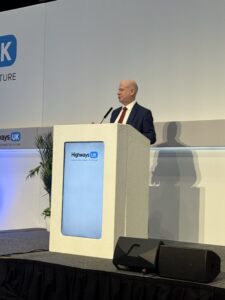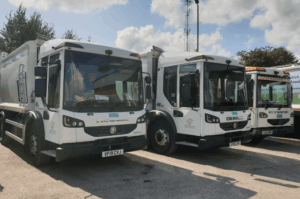Kier Highways has implemented a ‘no idling’ policy across it depots to help lower emissions.
The company has also introduced a new, economical and environmentally sustainable ‘Engine Idling Policy’ which comes into full effect today to mark Zero Emissions Day. The policy states that vehicles should not be left idling for longer than 60 seconds.
Before introducing the policy, Kier’s Birmingham Highways contract carried out a successful trial between May and August 2021. The results of this trial revealed that the number of minutes spent idling dropped from 15,127 (May) to 9,182 (August), a reduction of c.40% idling minutes. Over a year, this would mean a 7.4t carbon dioxide equivalent (CO2e) greenhouse gas reduction and it would save the business £3,400 over a year for this contract alone.
On average, an idling car wastes around half a gallon of fuel per hour – or about 2.2 litres. An idling diesel truck burns approximately double that amount at one gallon of fuel an hour. For every 100 hours this would equate to around 550kgCO2e of GHG emissions which is £240 of wasted fuel.
Contrary to popular belief, restarting an engine does not burn more fuel than leaving it running. The sustainability team at Kier Highways further explored why people idle their vehicles in its latest annual Green Travel survey. Based on the responses, the top six reasons were:
- For warmth/air-con – 26
- To run the beacons – 10
- Stationary in traffic – 11
- Stationary at lights – 9
- For ease/convenience – 8
- Brief site/hard shoulder inspection stops – 9
Kier Highways has looked into options to address the reasons for idling. Too address the temperature reason through the winter, standalone cab heaters will now come with all new procured fleet as a minimum standard. In the meantime, the team has asked employees to make sure the correct vehicle is selected for the task assigned to minimise idling.
Although they were a legitimate issue in the past, beacons are now LEDs and vehicles now have a cut off meaning the battery will never run flat due to beacons being left on.
The remaining reasons for idling (in traffic, at the lights, brief site visits etc.) are all about behaviour change. The sustainability team will be including a no idling case study into the Human and Organisational Factors Programme (behavioural change programme) in an effort to change this behaviour.
James Birch, managing director of Local Highways and the Kier Highways executive sponsor for environment and sustainability said: “Idling vehicle engines is probably something most people do at some point, whether it’s at work or on the school run. Switching engines off is a good habit to get into.
“From a business perspective it’s a no brainer. By getting people to switch off (when it’s safe to do so), we will help combat climate change, improve health and save money…a win, win, win. The trial in Birmingham demonstrated what a difference it can make, so if we can replicate this across the whole Highways business, it would be a great achievement.”
























